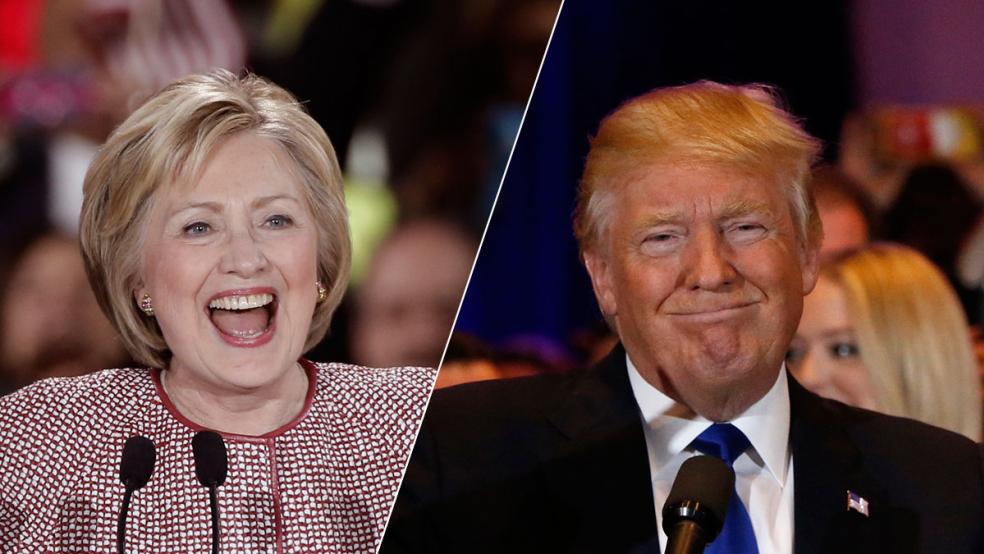It’s hard to imagine how fate could have been crueler to the Republican Party this election cycle. For years, GOP operatives have been salivating over the opportunity to go after Hillary Clinton in a presidential contest, and so far, with respect to Clinton at least, things couldn’t be going much better if Republican National Committee chairman Reince Priebus had scripted it personally.
On Thursday, it was revealed that Clinton’s senior aides from her time as secretary of state have been interviewed by the Federal Bureau of Investigation in connection with her decision to use a personal email account, operating on a private server, for sensitive State Department business.
Related: 5 Worlds Rocked by Donald trump’s Primary Victory
The fact that senior aides are now sitting down with federal agents suggests to many that the FBI is nearing the end of the process of investigating whether Clinton willfully violated the law by failing to keep classified government information secure. (For her part, Clinton has consistently argued that the private email system was never used for data that was classified at the time, though some material has been retroactively classified since.)
For Republicans, the timing could not be better. If the case wraps up in the next few months, regardless of whether Clinton is charged with wrongdoing -- and there is apparently very little evidence that she will -- it will be a great talking point for the GOP. Obviously, an indictment would be a political windfall. But even a decision not to recommend that the Department of Justice pursue a case against Clinton will bring the issue of Clinton’s judgment on the email issue back into the public discussion at a time when the Democrats are trying to increase the number of voters who have a favorable opinion of her.
This comes after a primary election in which Clinton faced unexpectedly tough opposition from Vermont Sen. Bernie Sanders, who ran consistently to the left of his former Senate colleague, forcing her to sound more liberal than she probably preferred on issues like trade and the minimum wage.
The Republican Party was always going to try to characterize Clinton as a wild-eyed leftist, but they probably didn’t count on a self-proclaimed Democratic Socialist from Vermont forcing her to take positions that would make doing so much easier.
Related: Veteran GOP Pollster Predicts Clinton Over Trump in November
There is also, lest anyone forget, the House Select Committee looking into the attacks on the U.S. State Department compound in Benghazi, Libya, in 2012, when Clinton was running the State Department. The committee has been flying well under the radar for months now, but it doesn’t seem like much of a stretch to assume that a final report will be issued sometime in the next three or four months, creating more awkward news cycles for Clinton.
All this, of course, is on top of the fact that Clinton is really pretty unpopular among the voting public. Even before the ugliness of a general election brings tens of millions of attack ads to the airwaves, she is already underwater in her approval/disapproval ratings.
In the end, given the demographic problems that the GOP faces in presidential elections, things couldn’t really look much better for a Republican’s chances to take the White House in November 2016.
But now, Donald Trump is the party’s de facto nominee. This isn’t the way it was supposed to be for the Republican Party in 2016.
Related: Trump’s Strange Choice to Lead His Fundraising Operation
Trump actively negates many of the advantages a Clinton candidacy confers on a Republican presidential nominee. For example, he is even less popular than she is among the voting public. And his long history of making public statements that are wildly offensive to women and ethnic and religious minorities, as well as people who can do basic mathematics, has presented opposition researchers and Democratic ad makers with an unprecedented treasure trove of source material.
The GOP, after its loss to Barack Obama in 2012, commissioned an “autopsy” of the party’s approach to the election, which determined that there were big demographic groups -- women, Hispanics, young people -- that the party needed to court if it wants to retake the White House. Trump has systematically alienated all of them.
It will also be difficult for a candidate who thought it would be a good idea to post a picture of himself about to eat a “taco bowl” to social media on May 5 -- Mexico’s Cinco de Mayo holiday -- with the message “I love Hispanics” to attack Clinton on her judgment.
Trump has also managed to contradict himself so completely on key economic and social policy issues that he has effectively blurred the distinction that the GOP would dearly like to make between its policies and Clinton’s. Just this week, Trump appeared to support a minimum wage increase, which most Republican lawmakers oppose and Clinton supports. His attitude toward international trade deals is more in line with Bernie Sanders than with the Republican mainstream.
The experience for GOP insiders must be something close to a waking nightmare. The 2016 presidential election is like a big, fat hanging curveball sitting right over the plate. And the party is standing in the box with a wiffle bat.





